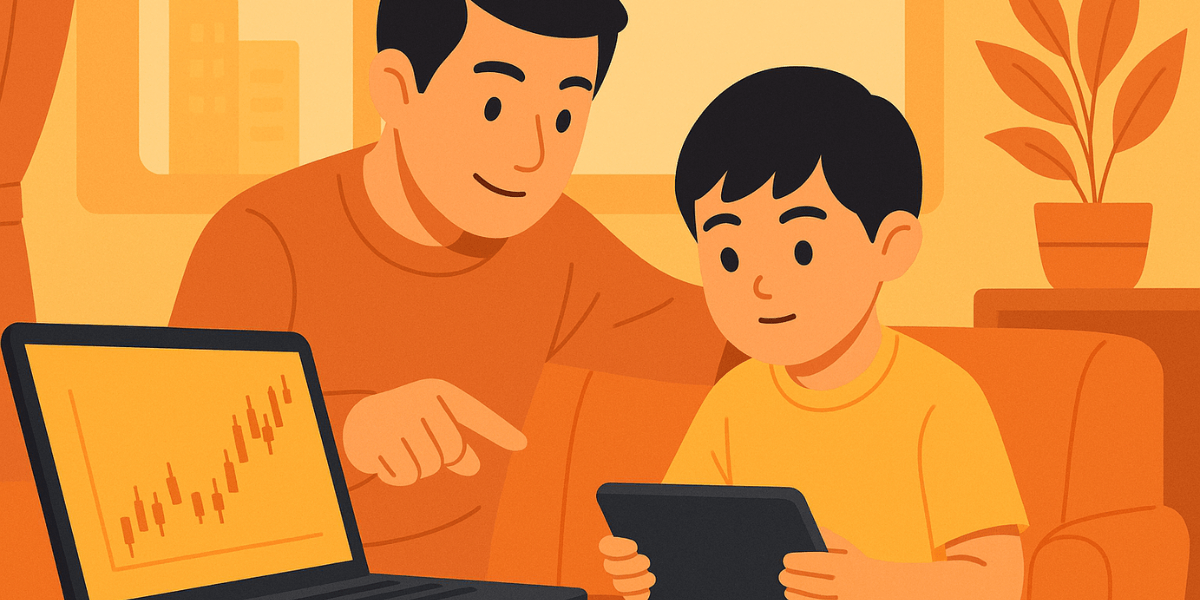Forex trading is often portrayed as an individual pursuit: one person, a screen, and the global market. What rarely receives the same attention is how deeply this activity influences the trader’s personal relationships. Partners, families, and close friends do not experience the market directly, yet they feel its consequences through changes in mood, availability, priorities, and financial dynamics.
In Asia, these effects are often magnified. Cultural expectations around responsibility, emotional restraint, family contribution, and long-term stability place additional pressure on traders. Trading sessions that extend late into the night, constant exposure to risk, and the internal demand to perform consistently can quietly reshape daily interactions at home. Over time, what starts as a professional ambition can spill into emotional distance, misunderstandings, and unspoken tension.
Forex trading does not inherently damage relationships. The damage appears when trading lacks structure, boundaries, and honest communication. When unmanaged, trading stress leaks into personal life, turning partners into emotional shock absorbers for market volatility. When managed consciously, trading can coexist with healthy relationships and even strengthen mutual respect. Understanding where the friction originates is the first step toward protecting both performance and personal life.
The Psychological Weight Traders Carry Home
Unlike traditional employment, Forex trading places full responsibility on the individual. There is no manager to blame, no fixed salary to rely on, and no guarantee that effort will be rewarded in the short term. This creates a unique psychological burden. Traders are constantly balancing confidence and self-doubt, discipline and fear, patience and urgency. Even after closing the platform, the mind often remains active, replaying decisions and imagining alternative outcomes.
At home, this internal dialogue does not disappear. Traders may seem distant, distracted, or emotionally flat, not because they are disengaged from their relationships, but because their cognitive resources are depleted. Partners, however, experience the behavior without context. They see silence where they expect connection, irritability where they expect support. Over time, this mismatch in perception becomes a source of frustration on both sides.
In many Asian cultures, expressing personal stress openly is not always encouraged. Traders may believe that bringing market-related stress into the family space is irresponsible or weak. As a result, they suppress emotions rather than process them. Suppression does not eliminate stress; it redirects it. The pressure eventually emerges as emotional distance, impatience, or sudden withdrawal, all of which strain personal relationships.
When Trading Becomes Identity
One of the most subtle dangers of Forex trading is identity fusion. Trading demands intense focus, continuous learning, and emotional regulation. Over time, the trader’s sense of self becomes intertwined with performance. Wins feel like validation, losses feel like personal failure. This psychological alignment makes it difficult to mentally step away from the market.
For partners, this shift can feel alienating. Conversations increasingly revolve around charts, trades, and future setups. Even moments meant for rest or intimacy are interrupted by market monitoring or mental calculations. The partner may feel invisible, as though they are competing with an abstract force that never sleeps. This is especially challenging in Asian households, where shared time and presence are strong indicators of care and commitment.
The trader, meanwhile, may feel misunderstood. From their perspective, trading is not obsession but responsibility. They believe they are working toward financial freedom or long-term security for the household. The tragedy is that both perspectives are valid, yet they collide when identity is consumed by a single pursuit.
Time Zones and the Cost of Being Always Available to the Market
The 24-hour nature of Forex markets creates a structural conflict with personal relationships. Traders in Asia often operate during nonstandard hours to align with major global sessions. This disrupts sleep patterns, social routines, and shared schedules. Even when physically present, the trader may be mentally preparing for a session or recovering from one.
Partners experience this as emotional absence. Dinner conversations are shortened, weekends are interrupted, and shared activities are postponed due to “market conditions.” Over time, these repeated micro-absences accumulate into emotional distance. The relationship begins to orbit the trading schedule rather than existing independently.
This dynamic is particularly damaging when boundaries are unclear. If trading hours expand unpredictably, partners never know when they truly have the trader’s attention. The lack of predictability erodes trust and creates resentment, even if the trader’s intentions are focused on providing long-term benefits.
Financial Risk and Relationship Security
Money is one of the most sensitive topics in any relationship, and Forex trading intensifies that sensitivity. Trading involves risk, drawdowns, and uncertainty. Even disciplined strategies experience losing periods. For partners who do not fully understand market mechanics, losses may feel reckless rather than strategic.
In many Asian cultures, financial stability is closely linked to moral responsibility. When trading introduces volatility into household finances, it can be interpreted as endangering family security. This perception creates fear, which often manifests as criticism or control attempts. Traders may respond defensively, feeling that their autonomy is under attack.
The most destructive pattern emerges when traders hide losses or downplay risks. While often intended as protection, secrecy undermines trust. Once financial transparency disappears, partners begin questioning not just money decisions but overall honesty. Restoring trust after financial concealment is significantly harder than addressing losses openly.
Emotional Spillover and Relationship Instability
Market volatility creates emotional residue. Even traders with strong discipline experience emotional fluctuations after intense sessions. Losses can produce irritability and withdrawal; wins can produce overstimulation or distraction. When these emotional states enter the relationship unfiltered, the partner absorbs the impact.
Over time, partners may become hyper-aware of the trader’s mood. They adjust their behavior to avoid conflict, creating an unspoken emotional imbalance. The relationship becomes reactive rather than supportive. Intimacy suffers because emotional safety requires predictability, and trading-induced volatility undermines that foundation.
This issue is often silent in Asia, where direct confrontation may be avoided. Instead of arguments, there is quiet withdrawal. By the time the trader notices the emotional distance, it may already be deeply rooted.
Conclusion
Forex trading is not just a financial activity; it is a psychological environment that shapes behavior, priorities, and emotional availability. Its impact on personal relationships is rarely intentional, but it is very real. The market does not stop at the edge of the screen, and neither do the pressures associated with it.
Healthy relationships require presence, emotional consistency, and trust. Trading challenges all three when boundaries are weak and communication is insufficient. For Asian traders in particular, cultural expectations around responsibility and emotional control can intensify these challenges, making it harder to express stress and negotiate needs openly.
The solution is not to abandon trading or relationships, but to structure both consciously. Clear trading schedules, financial transparency, emotional self-regulation, and honest communication transform trading from a source of conflict into a manageable profession. Traders who treat relationships with the same discipline they apply to markets are far more likely to sustain both long-term performance and meaningful personal connections.
Ultimately, success in Forex trading should enhance life, not isolate it. When trading begins to erode relationships, the cost may exceed any financial gain. Recognizing this early is not weakness; it is strategic awareness applied where it matters most.
Frequently Asked Questions
Can Forex trading really damage relationships?
Yes, especially when stress, financial risk, and time commitment are unmanaged. Trading itself is not the problem; lack of boundaries, transparency, and emotional regulation are the main causes of relationship damage.
Why do partners often feel neglected by traders?
Because traders may be physically present but mentally absorbed by markets. This creates emotional absence, which partners interpret as lack of interest or priority.
Is this issue more common among Asian traders?
The core issue is global, but cultural expectations around responsibility, emotional restraint, and family stability can intensify the impact in many Asian households.
Should traders share every loss with their partner?
Not every detail is necessary, but transparency about overall risk, drawdowns, and financial exposure is essential. Hiding losses is far more damaging than discussing them calmly.
Can trading and healthy relationships coexist?
Yes. Traders who set clear schedules, communicate openly, manage emotions, and respect relationship boundaries can maintain both trading performance and strong personal connections.
What is the biggest mistake traders make in relationships?
Allowing trading to become their entire identity and assuming partners will automatically understand the pressure without explanation or dialogue.
Note: Any opinions expressed in this article are not to be considered investment advice and are solely those of the authors. Singapore Forex Club is not responsible for any financial decisions based on this article's contents. Readers may use this data for information and educational purposes only.







